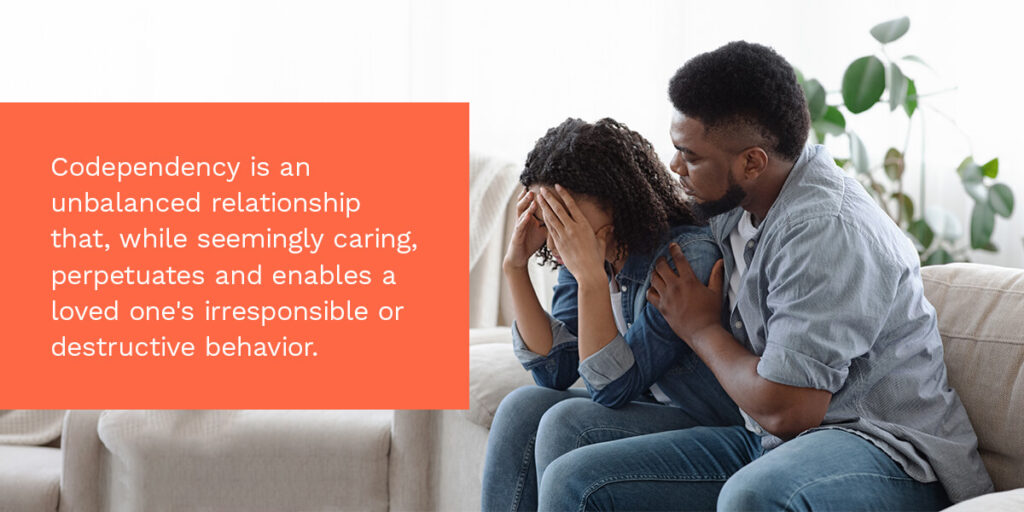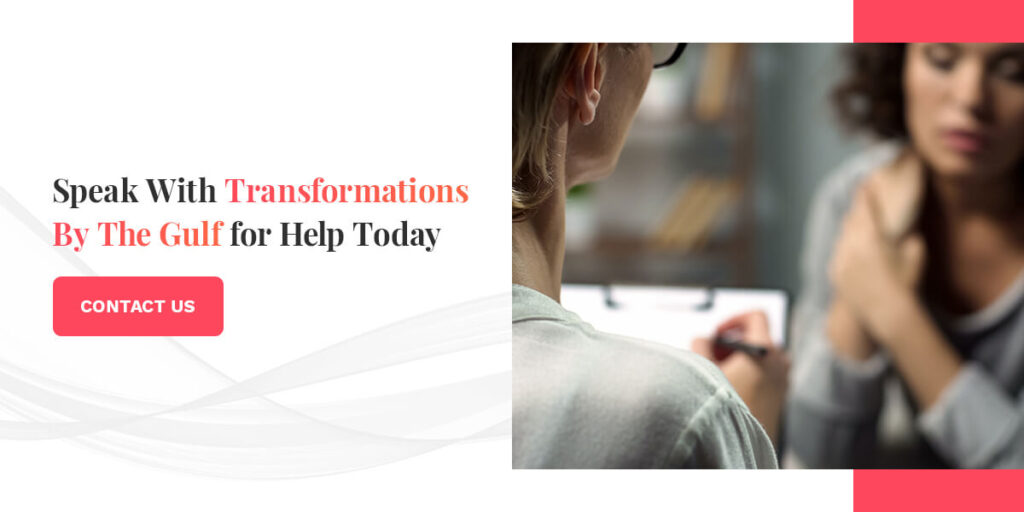The Role of Codependency in Addiction
Both addiction and codependency are psychological issues that often reinforce one another. Also known as “love addiction” or “relationship addiction,” people who are codependent often find themselves in one-sided relationships, whether they be familial, platonic or romantic, where they’re constantly “the giver” while the other person is “the taker.” More commonly, codependency is associated with people who have loved ones struggling with substance use or who are in addiction recovery.
Though everyone has codependent tendencies in relationships, people who are codependent feel a much more intense need to save others. As a result, they may find themselves attracted to those who are emotionally unavailable or where they’re in the caretaking role. Keep reading to learn the signs of a codependent relationship and how to get help for addiction recovery.
What Is Codependency in Addiction?
Codependency is an unbalanced relationship that, while seemingly caring, perpetuates and enables a loved one’s irresponsible or destructive behavior. While it may seem completely normal to care for a loved one, the codependent partner aims to alleviate any pain or inconvenience their partner is feeling. This is often an attempt from the codependent partner to try to justify or excuse their partner’s irresponsible or reckless behavior.
However, their sole focus on the other person only exacerbates deep-seated issues. The relationship often becomes a cycle that takes on a life of its own, where the person with substance use disorder (SUD) and the codependent reinforce each other’s behaviors. The codependent becomes obsessive, and the person with SUD might become more self-destructive or manipulative, leading to an unhealthy dynamic.
Some codependents feel that caring for others gives them self-worth and validation. In that sense, they may be motivated by a lack of self-love, hoping they’ll get the same love they provide in return. Like many relationship issues, codependency can be rooted in a dysfunctional childhood. For instance, children may have learned their only value was how much they gave to others, translating into codependency in adulthood.
Signs of Codependency in Addiction
Addiction and codependency often go hand in hand. Like individuals, families dealing with addiction often use codependency as a coping mechanism. They usually don’t realize how their behavior enables the person struggling with addiction.
While they may not recognize the signs listed below, the following signs typically indicate codependency:
- Having trouble expressing feelings and emotions
- Being unable to set clear boundaries..
- Ignoring or denying problems
- Having poor communication skills
- Feeling responsible for other people’s feelings
- Wanting to be liked by everyone.
- Being withdrawn and depressed.
- Suppressing thoughts and feelings out of fear or guilt.
- Needing to control and fix others.
- Having low self-esteem and self-worth.
- Setting aside your interests to do what others want.
- Being too loyal.
- Refusing to seek help because you feel like the problem isn’t bad enough or can’t be changed.
If the codependent individual can’t recognize the above signs or chooses to ignore them, they may unknowingly hinder their partner’s recovery. Poor boundaries, martyrdom and resentment often characterize codependent relationships with a person with SUD.
Codependent Relationship Dynamics
Experts note that substance use disorder isn’t just about the one affected but also the family and friends interfering with the recovery process.
Codependent individuals often believe they can take away another’s pain. This belief may subconsciously encourage codependents to enable their partner’s behaviors. Over time, this can create an unhealthy relationship dynamic that only feeds the codependent’s self-esteem and self-worth. It might also cause the codependent caregiver to become entangled in their partner’s lifestyle, leading to resentment.
If a codependent person enters a relationship with someone who allows the caretaking to continue, both people will be unable to grow or maintain a healthy dynamic. Three common types of substance abuse and codependency dynamics include:
- Codependent relationships with people with SUD: Codependents may provide money to enable their loved one’s addiction. They might also let them stay with them rather than attend treatment or even supply them with substances.
- Codependent relationships with people who are abusive: In relationships where one person abuses the other or their power, the codependent is forced to comply with their orders to keep the abuser in control. For example, the abuser may attempt to rationalize their poor behavior or manipulate the codependent to continue enabling their self-destructive behavior.
- Codependent relationships based on peer pressure: A codependent with self-esteem issues will typically fold under pressure to accommodate their partner’s demands.
How Can Codependency Affect Recovery?
Addiction codependency creates a fear of change for each person in the codependent relationship. Individuals undergoing recovery may be afraid to let go of their old behaviors for fear they’ll stop receiving care and attention from loved ones. At the same time, family members might avoid intervention, believing treatment “won’t work” or their loved one “won’t go.”
The actual reason families may be fearful is they see intervention as a step toward giving something up rather than an opportunity to help themselves and their loved ones. These fears aren’t based solely on the change itself but instead on the unknown that comes with change. One of the major issues to focus on in addiction recovery is to break the co-dependent patterns at home that enable and negatively support the person in treatment.
When a family member acquires maladaptive coping mechanisms and displays codependent or enabling behaviors, these skills become the new normal. The longer it takes for the SUD to be addressed, the more difficult it can be to change the dynamics, and the more likely families will ask fear-driven questions about recovery. Often, these expressions conceal their true feelings — a fear their loved one might say yes.
A loved one accepting help might give family members the message they need to change their behaviors. A successful intervention also means no more martyrdom or codependency. They now have to give up the caretaker role to the treatment center, which can be alarming to a codependent.
These thoughts and behaviors don’t make family members bad people but rather individuals caught in the throes of another’s issues and the resulting family roles. Fortunately, addiction treatment centers are equipped to handle substance abuse and codependency situations. We help families see their position from another perspective, so they may allow their loved ones to receive help.
Speak With Transformations by the Gulf for Help Today
Whether you believe you may be codependent or wish to seek addiction treatment services, Transformations by the Gulf can help. Our inpatient and outpatient programs can help you based on your psychological, biological, social and familial needs.
Our residential homes and treatment facilities provide a discreet, comfortable setting for rehabilitation. If you or a loved one needs help, contact us to learn more about our recovery services.
If you or someone you know would like to know more about Transformations by the Gulf Substance Abuse Treatment Center Give us a Call 24/7 (727)498-6498
The success of a person’s recovery depends on the level of personalized treatment provided. It is important to find an addiction treatment program that works. When we say our treatment is individualized, we mean that we craft a program that is tailored to address the client’s unique physical, mental and emotional needs. The Role of Codependency in Addiction.
In the client’s first 24 hours with us, we’ll evaluate their current state and work to understand what challenges they need to overcome. They’ll also have an initial session with our doctor and meet with one of our licensed mental health professionals.
After the initial evaluations, we’ll design a treatment plan with the sole mission of helping the client overcome and heal from addiction. Their program will focus on things such as:
- Addressing and Identifying root causes of addiction.
- Creating a support system.
- Developing healthy stress management techniques.
- Eliminating Substance use.
- Learning how to communicate emotions effectively.
- Maintaining a healthier lifestyle.
- Repairing damaged relationships.
Our Facility is near the beach and offers a comfortable setting for substance abuse treatment and recovery.
What a Day is Like in Our Treatment Facility.
Why Transformations by the Gulf?

